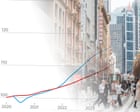
In recent times, the global economic landscape has witnessed a tapestry of pivotal changes, from evolving inflation rates to strategic trade deals and energy transitions. These shifts have brought both challenges and opportunities, painting a complex picture of contemporary economic dynamics. Let us explore these developments with a calm, collected lens, examining their implications and future outlooks.
The recent decline in inflation offers a glimmer of hope amidst the complexities of the cost-of-living crisis. In Australia, inflation has receded from the peaks seen in December 2022, now aligning closely with the Reserve Bank’s target range, resting at 2.1% as of June. This moderation in the pace at which prices rise is a welcome sign as it suggests a stabilization of economic conditions, offering a reprieve for households that have felt the brunt of rapidly increasing costs. However, the journey to fully resolve the cost-of-living crisis remains gradual, with households still working towards financial recovery as they navigate the more expensive landscape that persists.
Across the globe, another significant area of focus has been the recent trade developments between the United States and the European Union. A trade agreement brokered by former US President Donald Trump and the European Commission has been met with mixed receptions. The deal, ostensibly favoring the US, has led to a decline in investor confidence within the eurozone, as captured by the Sentix index. This shift reflects concerns over the economic repercussions of the tariff tensions that preceded the agreement, as stakeholders evaluate the broader impacts on the European markets. Such geopolitical moves remind us of the intricate balances and strategic maneuvers that underpin international trade.
Meanwhile, in the renewable energy sector, EDPR (EDP Renováveis) has made waves with its strategic sale of a solar portfolio in Spain, valued at 160 million euros. This transaction is more than just a financial maneuver; it signifies a notable stride towards achieving the company’s ambitious asset rotation goals of 2 billion euros for the year. The sale underscores the ongoing energy transition narrative, where investments and innovations in renewable sources continue to reshape the global energy outlook, reinforcing the commitment to sustainable development practices.
However, not all recent changes have been without hurdles. The introduction of new tariffs has posed challenges to Brazilian cacao exports to the United States, with the Associação Nacional das Indústrias Processadoras de Cacau expressing concern. The economic feasibility of these exports has been affected, demonstrating the nuanced effects that trade policies can have on agricultural sectors and international supply chains. As cocoa producers contend with these economic shifts, they also explore potential avenues to mitigate the impacts of these tariffs, ensuring sustainable operational models moving forward.
The current economic climate, characterized by these multifaceted developments, requires an adaptive and forward-looking approach. As inflation seeks equilibrium, regions adapt to new trade agreements, and sectors evolve in response to environmental imperatives and trade challenges, there is a palpable sense of transformation. Each development provides an opportunity—be it through honing fiscal strategies, re-evaluating trade practices, or deepening renewable engagements. It is through such insightful adjustments and concerted efforts that a balanced, resilient, and sustainable economic future can be nurtured.
Source: {link}
